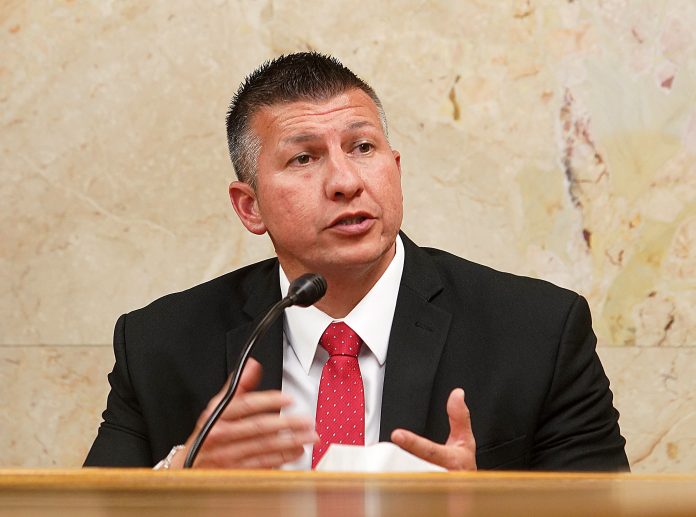
EDINBURG — After about a week of hearing testimony, jurors will now decide the fate of former Edinburg Mayor Richard Molina who is currently on trial for alleged misdeeds during the 2017 election that elevated him from councilman to mayor.
Jurors began their deliberations Wednesday afternoon after hearing closing arguments from the state prosecutors and Molina’s defense team on whether or not the former mayor is guilty of one count of engaging in organized voter fraud and 11 counts of illegal voting.
In the state’s closing argument, prosecutor Michael Garza repeated the message he made during his opening statement last week — that the jurors are armed with their common sense.
“Does it make sense to you that people who live in McAllen can vote in Edinburg when they don’t live there?” Garza asked. “Does it make sense to you that people from Russia can come vote in this country simply because they like the candidate or they once went to church there or they enjoy the park in that area?
“Is that reasonable that you could rely on that, because I submit to you, that is nothing but an excuse,” Garza said.
He pointed out that Molina admitted he helped people change their address so they could vote in the 2017 mayoral election, some of whom testified during the trial.
“They knew they weren’t eligible to vote and that’s all we have to prove,” Garza said, “and that they did it anyway. And that they did it at the sole insistence and pressure and relationships and psychological torment, for some, of Richard Molina.”
Molina’s attorneys argued that he made a mistake of law, meaning he made a reasonable mistake based on official government sources.
“If you review and rely on government sources and you come to the wrong conclusion … then ultimately the jury must find not guilty,” Jaime Peña, one of Molina’s attorneys, said.
But Garza tried to cast doubt on whether Molina actually read that case law, pointing out that when he questioned Molina on the stand, Molina could not recall the names of the cases he read.
Garza added that even if they believed Molina read those cases, he pointed out the cases dealt with residency disputes surrounding college students who wanted to vote where they lived while in school.
“There is not a residency dispute in this case,” Garza said. “Every single one of those witnesses told you ‘I didn’t live there, I never wanted to live there, I never laid my head there, I didn’t have any interest in being there; I’ve got my own family and my own house that I particularly like.’”
He also referred back to the testimony of Adolfo Cantu, one of Molina’s friends who said Molina asked him to change his address to vote in the election. As part of his testimony, Cantu said that when law enforcement began their investigation, Molina gave him a key to an apartment owned by Molina’s family to prove that he lived there. Cantu had used the apartment’s address to register to vote even though he actually lived outside the city limits.
Garza argued that if Molina really thought what they were doing was legal, he wouldn’t have done that.
During the defense’s closing arguments, Peña reminded the jury that the state had to prove beyond a reasonable doubt that the allegations against Molina were true.
Peña argued there was speculation involved in the state’s case, saying that investigator John Waits seemed certain that Molina assisted certain voters to change their address, but the registrations actually happened during a campaign event. Molina simply signed those applications and turned them in to the county because both actions had to be done by a voter registrar, which Molina was.
Ultimately, the case is about intent, Peña said.
“From count one to count 12, the issue is what was it that Mr. Molina intended to do?” Peña said. “Did he intend to break the law?”
He repeated that Molina made a mistake of law and reminded the jury that even if the state was able to prove its case, if the defense was able to prove by a preponderance of the evidence that Molina reasonably believed what they were doing was legal and reasonably relied on official sources, then the jury would have to find him not guilty.
Proving something by a preponderance of the evidence means it’s more likely than not to be the case.
When Carlos A. Garcia, also an attorney for Molina, took over the closing arguments, he alleged that Molina’s friends who testified against him only did so to avoid being charged with a crime themselves.
Garcia pointed out that one of those witnesses, Richard Ramirez, is under indictment and claimed that Ramirez only agreed to testify against Molina to have those charges dismissed.
Both Garcia and Peña questioned the thoroughness of Waits’ investigation by saying that Waits did not take the common law definition of residence — which allows for a variety of factors to determine residence — into consideration. It was that definition, they argued, that Molina relied upon in thinking that people could change their addresses to vote.
“He relies on the law and he learns that residency is a choice,” Garcia said. “Not because he says so, not because he’s making up an excuse, but because that’s what the opinion tells him.”
Jurors took a break from deliberations on Wednesday evening, but they are scheduled to resume deliberations at 9 a.m. Thursday.
To see more of Day 7 of Richard Molina’s voter fraud trial, view Monitor photojournalist Joel Martinez’s full photo gallery here:
PREVIOUS COVERAGE:
>> Day 1 (Photo Gallery)
>> Day 2 (Photo Gallery)
>> Day 3 (Photo Gallery)
>> Day 4
>> Day 5 (Photo Gallery)
>> Day 6 (Photo Gallery)




